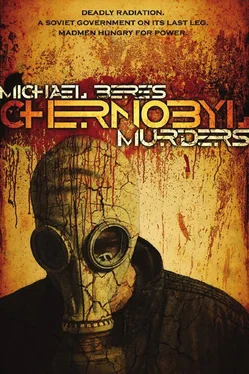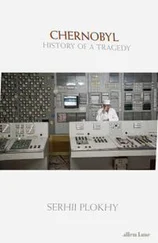Michael Beres - Chernobyl Murders
Здесь есть возможность читать онлайн «Michael Beres - Chernobyl Murders» весь текст электронной книги совершенно бесплатно (целиком полную версию без сокращений). В некоторых случаях можно слушать аудио, скачать через торрент в формате fb2 и присутствует краткое содержание. Жанр: Триллер, на английском языке. Описание произведения, (предисловие) а так же отзывы посетителей доступны на портале библиотеки ЛибКат.
- Название:Chernobyl Murders
- Автор:
- Жанр:
- Год:неизвестен
- ISBN:нет данных
- Рейтинг книги:4 / 5. Голосов: 1
-
Избранное:Добавить в избранное
- Отзывы:
-
Ваша оценка:
- 80
- 1
- 2
- 3
- 4
- 5
Chernobyl Murders: краткое содержание, описание и аннотация
Предлагаем к чтению аннотацию, описание, краткое содержание или предисловие (зависит от того, что написал сам автор книги «Chernobyl Murders»). Если вы не нашли необходимую информацию о книге — напишите в комментариях, мы постараемся отыскать её.
Chernobyl Murders — читать онлайн бесплатно полную книгу (весь текст) целиком
Ниже представлен текст книги, разбитый по страницам. Система сохранения места последней прочитанной страницы, позволяет с удобством читать онлайн бесплатно книгу «Chernobyl Murders», без необходимости каждый раз заново искать на чём Вы остановились. Поставьте закладку, и сможете в любой момент перейти на страницу, на которой закончили чтение.
Интервал:
Закладка:
“Why the hell did we speed up here if they’re going to wait until Sunday or Monday?”
“What kind of food did you bring?”
“Sausage and bread.”
“I snuck in a bottle under my seat. If you would like to bring your sausage to my bus…”
“I’ll be right back.”
At the crossroads where the roads from the towns of Chernobyl and Pripyat joined, more buses were waved through. Militiamen, who had not covered their faces earlier, did so now. A few even had masks with filters.
The militiamen stopped the flow of buses momentarily to allow through several fire trucks heading for the plant.
“Did you see the insignia on the last fire truck?” said a militiaman wearing a scarf over his mouth and nose.
“Where was it from?” asked a militiaman wearing one of the filter masks.
“It said Borzna. That’s on the other side of the river.”
“They’re coming from all over,” said the filter mask. “I wonder if the KGB guards over there in their car know something.”
“They always do,” said the militiaman, tightening the scarf across his face.
Viewed from the far side of the cooling pond, a flicker of flame could be seen through thick smoke coming from the skeletal remains of Chernobyl’s unit four. A helicopter with lights shining through the smoke dropped a load of sand and sped away. On the ground near the fire, floodlights illuminated several figures in iridescent silver body suits manning hoses trained on the fire and on surrounding buildings. In the distance, the lights of more helicopters appeared.
They looked like airliners lined up for landing at an airport.
It was after midnight, Sunday, April 26, almost a full twenty-four hours since unit four exploded. Waterfowl had settled in for a night in the shallows of the cooling pond. Some waterfowl seemed perfectly healthy, while others appeared disoriented.
13
Because it was early Sunday morning, the absence of Kiev’s buses went unnoticed. Spouses or partners did not think it unusual for a driver to be called in for special duty. It happened sometimes.
A spring shower had cleansed Kiev’s streets during the night, the sun filtered through thin wisps of cloud, and smells of rainwater and greenery and breakfast were in the air. Russian Orthodox Palm Sunday had brought out several pedestrians who managed to find a service. They carried palms as they headed back to their apartments.
Lazlo and Tamara walked to a combination cafe and bakery a few blocks from his apartment. They sat at a small table sipping strong coffee and munching on an assortment of strudel while patrons purchased crackling white bags of sweets at the counter.
The proprietress behind the counter was a short, plump woman with skin as white as the powdered sugar abundantly sprinkled on the pastries in the windowed case. Every few minutes the baker, who was the woman’s husband, came through a swinging door to replenish the supply in the case. He was skinny, his baker’s cap making him look as if it might tip him over on his head.
Tamara had pinned her hair atop her head and wore a sweater and short skirt, which attracted glances from the men who came into the bakery. Her earrings, with gold stars dangling from chains, swung from side to side as she chewed.
“I like the cheese filling best. Which is your favorite, Laz?”
“Poppy seed.”
“I don’t usually eat breakfast. Nothing but coffee when I get to the office. Most of the poets who contribute to the journal are skinny as hell. I should bring them here, fatten them up.”
“They’d write poems about pastry instead of politics,” said Lazlo.
Tamara licked cheese from her fingertip. “Ode to a strudel.
Much healthier than politics. Poets are a lot like you, constantly brooding. Sometimes I think they’d all like to go to a labor camp to die the way Vasyl Stus died.”
“How did he die?”
“He was typical of many poets who search for connections between the specifics of politics and the universals of life instead of simply enjoying the here and now.”
“I’m enjoying myself now.”
“And last night?” asked Tamara.
“Metaphorically, last night was like eating a thousand strudels.”
The number of carryout patrons increased, and the baker made more trips to keep the case full. The cheeks of the proprietress reddened despite her doughy complexion. A middle-aged man at the counter placed his order in Ukrainian instead of the usual Russian.
“Will your family be able to eat all this?” asked the proprietress.
“My family has doubled,” said the man. “My brother-in-law and his family came unexpectedly in the middle of the night. Woke me up saying they had to abandon their home.”
“What happened?”
“Some kind of accident at the nuclear plant where he works. He said many have abandoned the area because the air and water may be poisoned.”
“The air and water?” said the proprietress. “Where is this?”
“At Chernobyl, to the north. My brother-in-law lives in Pripyat.
He said there’s no problem here because of the distance. But up there he says people are panicking.”
Lazlo felt cold, as if he had been thrust back into the wine cellar with Mihaly last summer on the farm, Mihaly warning of danger at Chernobyl.
Lazlo left the table, stood behind the man at the counter.
The man continued with the proprietress. “My tiny apartment is like a metro station. My brother-in-law has two teenaged daughters. They have already taken over the bathroom.”
“Has there been anything on the news about this?” asked the proprietress.
“Nothing. We watched the early news and listened to the radio.
I was beginning to think my brother-in-law’s moving in with us was part of some clever scheme. But this morning a neighbor heard of another family on the next block whose relatives also arrived last night.”
The man picked up his packages. “I’ll probably see you again tomorrow. These relatives will eat me out of house and home.”
The man tried to leave, but Lazlo stepped sideways, blocking his path. He spoke in Ukrainian. “Excuse me, comrade. I couldn’t help overhearing you.”
“What do you want?” said the man, eyeing Lazlo suspiciously.
“My brother lives in Pripyat. Please tell me, did your brother-in-law give any details about the accident?”
“Nothing more. You overheard everything I know.”
“What about your brother-in-law? I’d like to speak with him.”
“I… I don’t know. It will surely be on the news. Watch the news.”
The man tried to step past, but Lazlo blocked him. “Please.”
“I must go,” said the man.
Lazlo stood his ground, sighed, took his wallet from his pocket, and showed the man his militia identification.
“I’ve done nothing wrong!” screeched the man.
“Please, my brother and his family live in Pripyat. My brother works at the Chernobyl plant. Perhaps your brother-in-law can tell me something. Perhaps he even knows my brother.”
Lazlo and Tamara and the man left the bakery, walked less than a block to an apartment building. Inside the apartment, two women eyed Tamara.
The brother-in-law and his wife were about the same age as Mihaly and Nina, but the daughters were older than Anna and Ilonka.
A little boy and a baby, apparently the resident children, were also in the room. It was so crowded the children sat on the floor.
The brother-in-law’s name was Yuri Tupolev. Despite Lazlo’s assurances, Tupolev worried he would get in trouble.
“I had days off coming. Maybe they need help, but nobody told me to stay. I wanted to turn back, but my family…”
“I understand,” said Lazlo. “Believe me, I’m also here because of family concern. You say you know Mihaly Horvath?”
Читать дальшеИнтервал:
Закладка:
Похожие книги на «Chernobyl Murders»
Представляем Вашему вниманию похожие книги на «Chernobyl Murders» списком для выбора. Мы отобрали схожую по названию и смыслу литературу в надежде предоставить читателям больше вариантов отыскать новые, интересные, ещё непрочитанные произведения.
Обсуждение, отзывы о книге «Chernobyl Murders» и просто собственные мнения читателей. Оставьте ваши комментарии, напишите, что Вы думаете о произведении, его смысле или главных героях. Укажите что конкретно понравилось, а что нет, и почему Вы так считаете.












